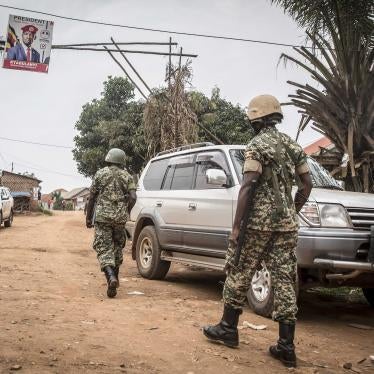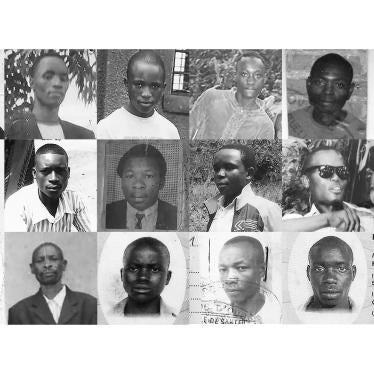The Ugandan authorities have arrested two key opposition members of parliament on what appear to be politically motivated charges, chilling the political climate ahead of next year’s elections, Human Rights Watch said today.
Two MPs from the opposition Forum for Democratic Change, Ronald Reagan Okumu and Michael Nyeko Ocula, were arrested on April 20 by the Criminal Investigations Division of the police. Okumu is the party’s deputy executive coordinator and MP for Aswa County, Gulu district; Ocula is MP for Kilak County, also in Gulu.
The Forum for Democratic Change is the political party widely believed to pose the greatest challenge to the reelection of President Yoweri Museveni next year. Okumu has been a prominent opponent in parliament of a bill that would allow Museveni to stand for a third term as president.
“The arrest of these opposition MPs smacks of political opportunism,” said Jemera Rone, researcher in Human Rights Watch’s Africa Division. “Holding them without trial would prevent them from campaigning before the election. The government must promptly provide for a fair trial or release them.”
The two politicians, both from northern Uganda, were charged with the February 2002 murder of Alfred Bongomin, council chairman of Pabbo sub-county, Gulu, and were then remanded to Luzira Prison in Kampala. In the past two years, Human Rights Watch has documented how the government has used capital charges to detain political opponents for prolonged periods of time, often for more than a year. Rarely have any of these cases been brought to trial.
The arrests also highlight concerns about Uganda’s law on bail and remand. The Ugandan constitution provides that suspects preliminarily charged with a capital offense—such as treason, kidnapping, rape, and murder—may be held in detention for 360 days before they are entitled to bail.
The law is intended to give the police and prosecutors time to investigate the case. However, it requires no showing of any evidence to connect the accused to the crime until the completion of the criminal investigation, for which there is no time limit.
Consequently, as long as investigations are ongoing, suspects can be held for the full 360 days without bail before a court is required to make any assessment of the strength of the evidence against them. In most cases researched by Human Rights Watch, the police had not completed their investigations by the time the 360-day period for detention without bail had expired.
Human Rights Watch called on the Ugandan parliament to amend the 360-day detention without bail provision of the constitution to explicitly provide for bail in accordance with international law. These provisions are inconsistent with Uganda’s obligations under the International Covenant on Civil and Political Rights, which states that individuals charged with a criminal offense are “entitled to trial within a reasonable time or release.”
In almost all cases that Human Rights Watch has investigated in Uganda the past two years, the prosecution has taken at least the full 360 days to complete the investigation. In the case of Okumu and Ocula, Internal Affairs Minister Ruhukana Rugunda reportedly stated in parliament on April 21 that the prosecutor had completed inquiries into the matter. The following day the prosecutor asked the magistrate for an adjournment for “further investigation” of the offense that happened three years ago, increasing the possibility that the two MPs will be detained for a prolonged period.
The two MPs were earlier victims of intimidation by the army when they visited Pader district in northern Uganda in November. They were members of a group of parliamentary MPs and activists intending to hold a public meeting on proposed constitutional amendments. Soldiers beat several members of the group and refused to allow the meeting to take place.
Hailing from northern Uganda, Okumu has been a vocal defender of human rights in his district. As recently as last month he wrote an open letter to the minister of defense calling for the government and the army to account for a series of killings and beatings by the army’s 11th Battalion in two camps for the displaced persons in his constituency early this year.
In the same letter, Okumu also complained about the illegal detention in Gulu military barracks of two Gulu elected officials and a local businessman. Ironically, he is now in the same prison as these three men—Steven Olanya, Achan Laryang and David Ocheng. All have been charged with the same 2002 murder. When initially detained in March, the three men were accused of an entirely different crime.
Human Rights Watch is concerned that these arrests may be part of a broader campaign to intimidate the opposition. In recent months, a number of other members of the political opposition have been arrested, including the chairman of the FDC in Rukungiri district in southwestern Uganda. They are now in prison on remand for the capital offense of treason.
“Reagan Okumu and Michael Ocula have become latest members of the political opposition languishing in jail on apparently trumped up charges,” Rone said. “As elections loom, the government needs to demonstrate its commitment to a genuine transition to multiparty democracy. It needs to bring those charged to a speedy and fair trial or release them.”
All five suspects are Acholi from northern Uganda, where an 18-year war between government forces and the rebel Lord’s Resistance Army—composed almost entirely of Acholi—has forced at least 80 percent of the Acholi population into camps for the displaced. The LRA is guilty of gross human rights abuses, and recent efforts to negotiate a peace agreement have stalled.






